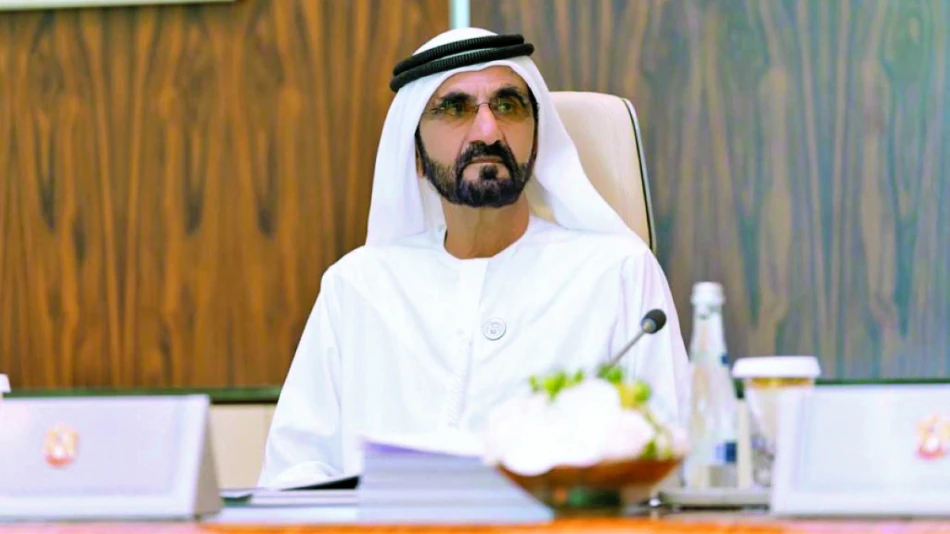
UAE Cabinet Approves Restructuring of Gender Balance Council under Mohammed bin Rashid's Leadership
UAE Restructures Gender Balance Council in Strategic Push for Global Leadership
The UAE Cabinet has approved a comprehensive restructuring of the Emirates Gender Balance Council, expanding its mandate and strategic role as the nation positions itself as a global model for gender equality. Led by Sheikh Mohammed bin Rashid Al Maktoum, the decision reflects the UAE's systematic approach to embedding gender balance across government and private sectors while strengthening its competitive edge in international rankings.
Expanded Powers Signal Institutional Commitment
The restructured council now reports directly to the Cabinet and gains significant new authority to propose, review, and monitor gender balance policies and legislation across all sectors. This institutional elevation demonstrates how the UAE is treating gender equality not as a social initiative, but as a core economic and strategic priority.
The council's enhanced mandate includes developing legislative and regulatory frameworks that support gender balance efforts in both government and private sectors, aligning with the nation's future vision and strengthening its position in related global indices.
Strategic Leadership Composition
The reconstituted council under Sheikha Manal bint Mohammed bin Rashid Al Maktoum brings together senior officials from key ministries including Finance, Economy, Foreign Affairs, and Human Resources. This cross-ministerial approach ensures gender balance considerations are integrated into economic policy, international relations, and workforce development.
Regional Leadership Model Emerges
The UAE's approach contrasts sharply with regional peers and mirrors successful models from countries like Iceland and Nordic nations that have achieved top global gender equality rankings. Unlike many Middle Eastern countries where gender initiatives remain largely ceremonial, the UAE has embedded these efforts into its core governance structure.
Sheikha Manal emphasized that the UAE's experience has become a "qualitative model" that is being emulated regionally and internationally. This positioning as a gender equality exporter represents a soft power opportunity for the UAE, similar to how it has leveraged its business-friendly environment and technological innovation.
Economic Competitiveness Strategy
Deputy President Mona Ghanem Al Marri highlighted how the UAE's gender balance achievements have inspired other nations in the region and globally. The emphasis on making the UAE an exporter of best practices in gender balance suggests a deliberate strategy to build international influence through progressive social policies.
Global Ranking Ambitions Drive Policy
The restructuring comes as countries worldwide compete intensively on gender equality metrics, with rankings like the World Economic Forum's Global Gender Gap Report influencing international investment and diplomatic relationships. The UAE currently ranks first globally in several gender balance indicators, a position it aims to defend and expand.
The council's direct reporting line to the Cabinet ensures gender considerations influence major economic decisions, from workforce policies to international trade agreements. This institutional design reflects lessons learned from countries like Rwanda and Singapore, where high-level political commitment translated into measurable progress.
Private Sector Integration
The expanded mandate specifically targets both government and private sectors, recognizing that sustainable gender balance requires corporate participation. This dual approach mirrors successful initiatives in countries like Norway, where government mandates for corporate board diversity created systemic change across the economy.
The UAE's strategy appears designed to create competitive advantages in attracting international talent and investment, particularly as global corporations increasingly prioritize diversity and inclusion in their operations and partnerships.
Long-term Vision Meets Immediate Goals
The restructuring represents more than administrative reorganization—it signals the UAE's commitment to maintaining its position as a regional outlier on gender equality while building this into a broader national competitiveness strategy. By treating gender balance as both a social imperative and economic advantage, the UAE is positioning itself for sustained leadership in an area where many regional competitors lag significantly.
The emphasis on legislative and regulatory framework development suggests the UAE is building institutional permanence into its gender equality efforts, ensuring they survive political transitions and economic cycles. This long-term approach reflects the strategic thinking that has driven the UAE's success in other areas like renewable energy and space exploration.
Most Viewed News

 Sara Khaled
Sara Khaled






